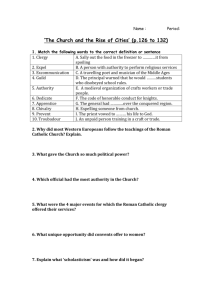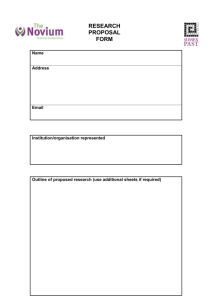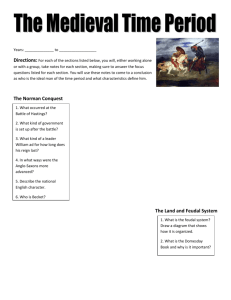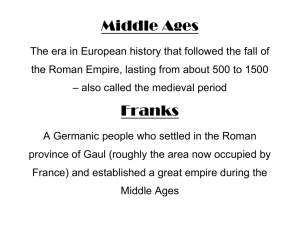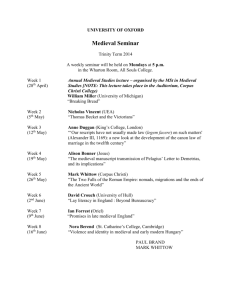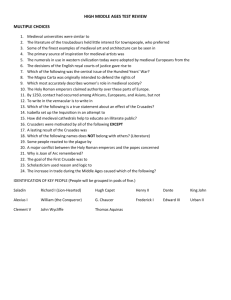Chapter 13 Vocabulary canon law -n. the body of laws governing the
advertisement
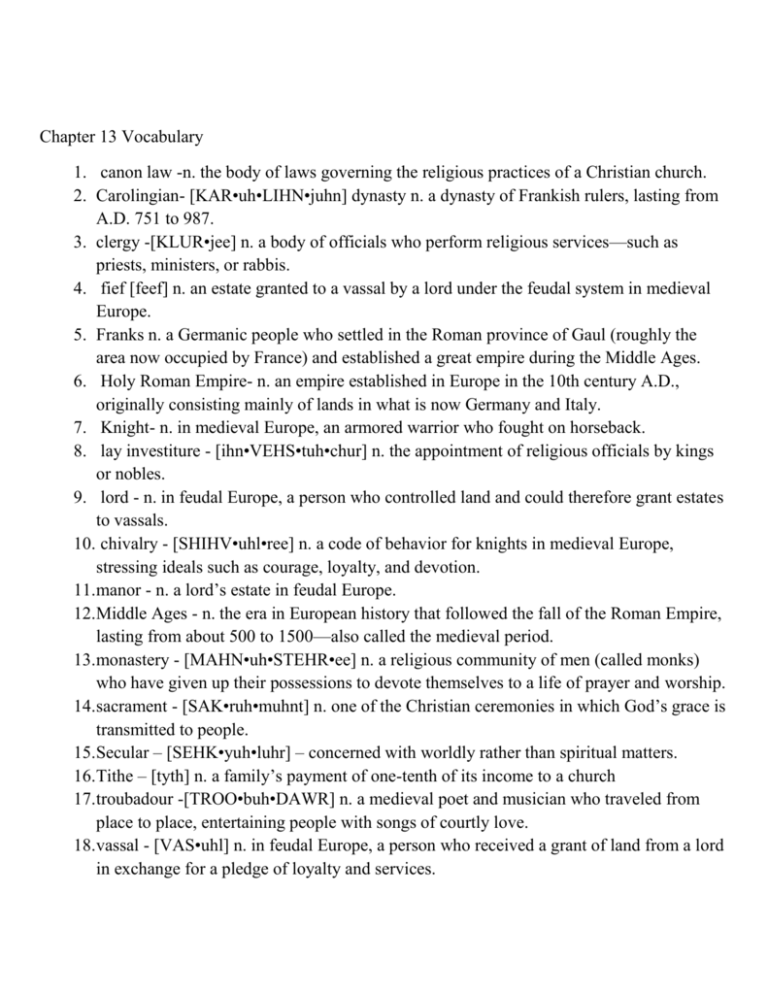
Chapter 13 Vocabulary 1. canon law -n. the body of laws governing the religious practices of a Christian church. 2. Carolingian- [KAR•uh•LIHN•juhn] dynasty n. a dynasty of Frankish rulers, lasting from A.D. 751 to 987. 3. clergy -[KLUR•jee] n. a body of officials who perform religious services—such as priests, ministers, or rabbis. 4. fief [feef] n. an estate granted to a vassal by a lord under the feudal system in medieval Europe. 5. Franks n. a Germanic people who settled in the Roman province of Gaul (roughly the area now occupied by France) and established a great empire during the Middle Ages. 6. Holy Roman Empire- n. an empire established in Europe in the 10th century A.D., originally consisting mainly of lands in what is now Germany and Italy. 7. Knight- n. in medieval Europe, an armored warrior who fought on horseback. 8. lay investiture - [ihn•VEHS•tuh•chur] n. the appointment of religious officials by kings or nobles. 9. lord - n. in feudal Europe, a person who controlled land and could therefore grant estates to vassals. 10. chivalry - [SHIHV•uhl•ree] n. a code of behavior for knights in medieval Europe, stressing ideals such as courage, loyalty, and devotion. 11.manor - n. a lord’s estate in feudal Europe. 12.Middle Ages - n. the era in European history that followed the fall of the Roman Empire, lasting from about 500 to 1500—also called the medieval period. 13.monastery - [MAHN•uh•STEHR•ee] n. a religious community of men (called monks) who have given up their possessions to devote themselves to a life of prayer and worship. 14.sacrament - [SAK•ruh•muhnt] n. one of the Christian ceremonies in which God’s grace is transmitted to people. 15.Secular – [SEHK•yuh•luhr] – concerned with worldly rather than spiritual matters. 16.Tithe – [tyth] n. a family’s payment of one-tenth of its income to a church 17.troubadour -[TROO•buh•DAWR] n. a medieval poet and musician who traveled from place to place, entertaining people with songs of courtly love. 18.vassal - [VAS•uhl] n. in feudal Europe, a person who received a grant of land from a lord in exchange for a pledge of loyalty and services. Chapter 14 Vocabulary 1. bubonic plague [boo•BAHN•ihk PLAYG] n. a deadly disease that spread across Asia and Europe in the mid-14th century, killing millions of people. 2. burgher [BUR•guhr] n. a medieval town dweller. 3. Crusade n. one of the expeditions in which medieval Christian warriors sought to recover control of the Holy Land from the Muslims. 4. Gothic [GAHTH•ihk] adj. relating to a style of church architecture that developed in medieval Europe, featuring ribbed vaults, stained glass windows, flying buttresses, pointed arches, and tall spires. 5. Great Schism [SIHZ•uhm] n. a division in the medieval Roman Catholic Church, during which rival popes were established in Avignon and in Rome. 6. guild [gihld] n. a medieval association of people working at the same occupation, which controlled its members’ wages and prices. 7. Hundred Years’ War n. a conflict in which England and France battled on French soil on and off from 1337 to1453. 8. Inquisition [IHN•kwih•ZIHSH•uhn] n. a Roman Catholic tribunal for investigating and prosecuting charges of heresy—especially the one active in Spain during the 1400s. 9. Magna Carta [MAG•nuh KAHR•tuh] n. “Great Charter”—a document guaranteeing basic political rights in England, drawn up by nobles and approved by King John in A.D. 1215. 10.parliament [PAHR•luh•muhnt] n. a body of representatives that makes laws for a nation. 11.Reconquista [reh•kawn•KEES•tah] n. the effort by Christian leaders to drive the Muslims out of Spain, lasting from the 1100s until 1492. 12.scholastics [skuh•LAS•tihks] n. scholars who gathered and taught at medieval European universities. 13.simony [SY•muh•nee] n. the selling or buying of a position in a Christian church. 14. three-field system n. a system of farming developed in medieval Europe, in which farmland was divided into three fields of equal size and each of these was successively planted with a winter crop, planted with a spring crop, and left unplanted. 15.vernacular [vuhr•NAK•yuh•luhr] n. the everyday language of people in a region or country.
